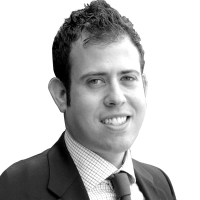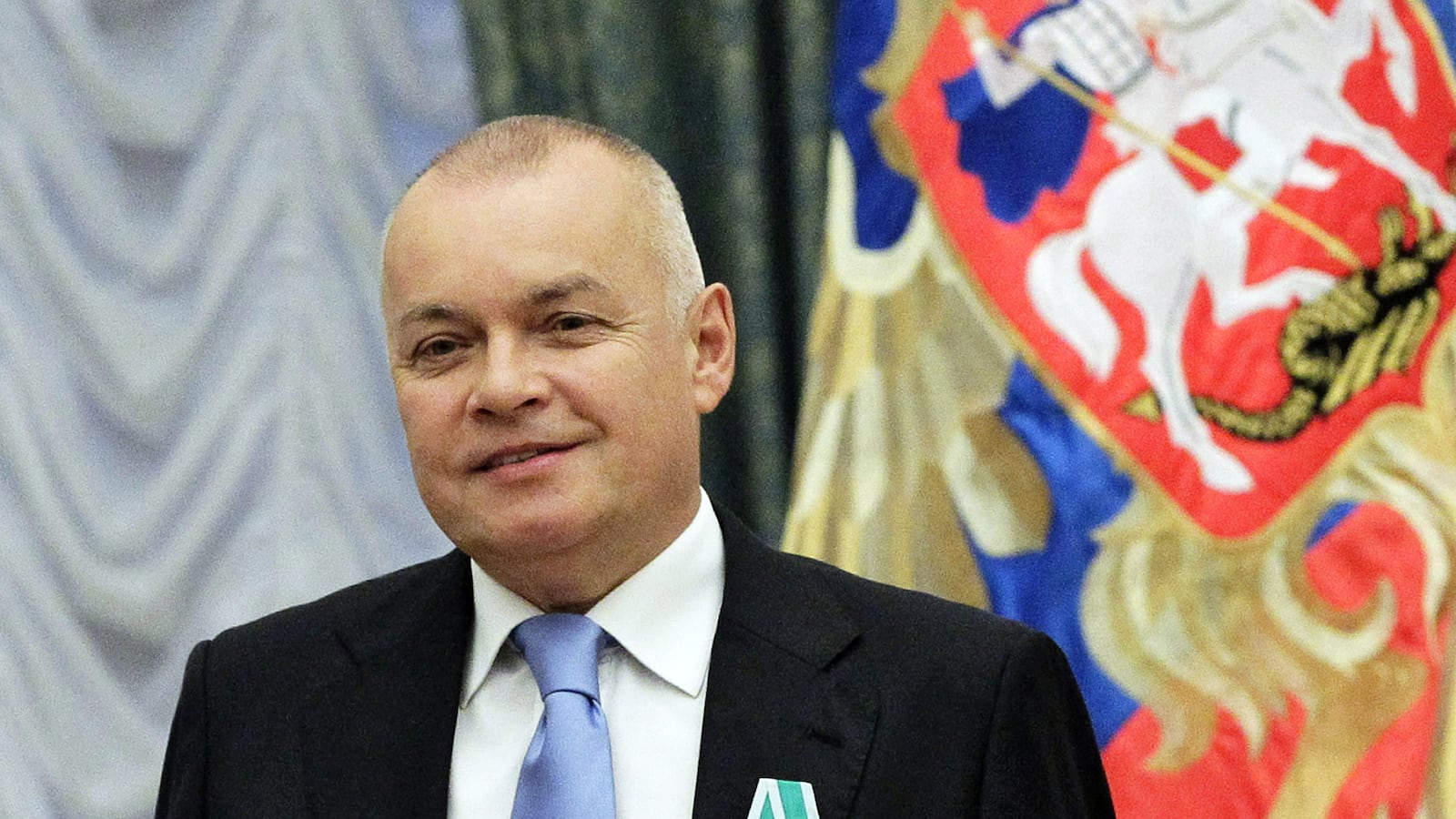Did you know that in Sweden, “early sex is the norm—from the age of nine?” Or that the pro-European protests rocking Ukraine are part of a Western plot to revenge 18th-century Tsarist military victories? And not only should gays be prohibited from donating organs, but their hearts, upon death, should be burnt or buried because they are “unsuitable for extending the life of another?”

Welcome to the world of Dmitry Kiselyov, now the most powerful man in Russian media.
For years, Kiselyov was just a garden variety Russian nationalist and propagandist for the regime of Vladimir Putin, waxing conspiratorially on his weekly television show about Western plans to undermine the Motherland. Last month’s Vilnius Summit, right before which Ukrainian President Viktor Yanukovych rejected an Association Agreement with the European Union, thereby sparking the massive protests now entering their fourth week, was—Kiselyov claimed—the modern-day equivalent of the notorious Munich agreement ceding the Czech Sudetenland to Nazi Germany. “The only difference is that today’s goal is to deprive Russia of its allies, and tear Ukraine away,” he declared. Kiselyov is fond of Third Reich references, likening Russian anti-corruption campaigner and Putin critic Alexey Navalny to Hitler. Nor is his homophobia limited to the dignity of dead homosexuals; a 22-year-old Russian gay man, Kiselyov recently claimed, had brought about his brutal murder by “provoking” his assailants with the mere revelation of his homosexuality.
Such extreme rhetoric is hardly rare in Russia, as the Kremlin has been pumping anti-Western propaganda and homophobia to the populace for years. But Kiselyov has been elevated from mere television host to head of a newly restructured state media outlet. Last Monday, the Russian government unveiled a surprise plan to abolish RIA-Novosti, the relatively well-respected state news agency, and replace it with a new organization called RossiyaSegodnya (“Russia Today”), with Kiselyov at its head.
Though it shares the name of Moscow’s international language broadcaster (which in 2008 adopted the more anonymous moniker “RT”), the new agency will be independent from the television channel, which regularly gives a platform to 9/11 conspiracy theorists and political extremists of all stripes (and which booted me off the air earlier this year after I protested Russia’s anti-gay laws). Observers of the Russian press have noted that the surprise move effectively consolidates the already limited Russian media even further under President Putin’s control. RIA-Novosti, formed in 1941 and with reporters based in over 45 countries, was the last vestige of respectable state media. “Widely regarded as a capable and effective manager, [editor-in-chief Svetlana] Mironyuk built a strong reputation for the agency, based on the quality of its reporting at home and abroad,” writes to John Lough of the London-based Chatham House think tank. Some Kremlin-watchers suspect that RIA-Novosti’s neutral coverage of anti-Putin protests in 2012 ultimately convinced the Kremlin that the agency was causing more trouble than it’s worth.Announcing its own demise, RIA-Novosti displayed some of the objectivity that was sorely lacking in Russian media, and that will now all but disappear: “The move is the latest in a series of shifts in Russia’s news landscape, which appear to point toward a tightening of state control in the already heavily regulated media sector.”
Sergey Ivanov, head of Putin’s presidential administration, was explicit in his avowal that the purpose of “Russia Today” will be the promotion of Russian influence abroad. The creation of the new organization, he says, demonstrates that “Russia is pursuing an independent policy, firmly protecting its national interests and explaining this to the world is not easy, but it can and must be done.” As for Kiselyov, he says that “Russia Today” will be “restoring a fair attitude towards Russia as an important country in the world with good intentions.”
Hiring Kiselyov to “restore a fair attitude towards Russia” may do that, just not in the way the Kremlin intends. For a “fair” reading of contemporary Russia is that the country plays a consistently malign role in world affairs. Kiselyov embodies the Kremlin’s bullying and intolerance, making enemies out of anyone who does not delight in his Russian jingoism. With his show broadcast across the Russian-speaking world, including many of the countries that once composed the Soviet Union and Warsaw Pact, he has become the face of aggressive Russian nationalism in the age of Putin. His ranting about Russian honor and the ingratitude of the country’s neighbors will hardly sound new to people living in countries that spent decades or longer under Russian subjugation. The protests in Ukraine, Kiselyov declares, are really “pogroms” sponsored by shadowy “foreign forces.” Meanwhile, he says, Swedish Foreign Minister Carl Bildt, one of the most outspoken European leaders backing the demonstrators, was a CIA agent in his youth. In one particularly bizarre 18-minute rant, Kiselyov claimed that a segment from a Swedish children’s television show about bodily functions depicts “European values in all their glory.” Kiselyov’s portrayal of the Ukrainian protestors as fascist puppets of the West has earned him few fans outside the circle of Russians already loyal to Putin. In Kiev, one protestor strode up to a correspondent from Russian state television and attempted to hand him “an Oscar for the nonsense and lies” of Kiselyov.
The closure of RIA-Novosti and its replacement with a new agency headed by a pro-regime mouthpiece is but the latest sign of Russia’s dark slide to authoritarianism under Putin. Threatened by rising discontent at home, the Kremlin is on the hunt for more enemies, foreign and domestic, to scapegoat for its failures. Learning from the experience of the Soviet Union, Moscow is trying to supplement its traditional tools of extortion and violence with the more subtle instruments of soft power. It has been remarkably successful; RT is the most watched online news channel in the world with over a billion viewers. A former KGB man who earned his chops harassing dissidents in East Germany, Putin has always been suspicious of the West, yet that distrust has never been expressed in so fervid or paranoid a fashion as it has over the past several years.
It is in the light of this ideological offensive that the appointment of Kiselyov —with all of his bigoted fear-mongering—as chief propagandist makes sense. Earlier this month, Putin attempted to draw a line between the traditional, moral Slavic East (led, of course, by his proud Russian nation), and the decadent, post-Christian West, embodied by an EU that insists its members allow the staging of gay pride parades. “This destruction of traditional values from above not only entails negative consequences for society, but is also inherently anti-democratic because it is based on an abstract notion and runs counter to the will of the majority of people,” Putin declared in his annual state of the nation address, which the Daily Telegraph headlined as having established Russia as the “moral compass” of the world. But as the Russian writer Peter Pomerantsev points out, only four percent of Russia’s self-identified Orthodox Christians attend church regularly and the country has extremely high rates of abortion, divorce, prostitution and corruption—figures belying Putin’s claims of a virtuous Russia standing athwart a rising tide of Western depravity. With the Kremlin arming the mass-murdering Bashar al-Assad in Syria, propping up the skull-cracking Yanukovich in Ukraine, and appointing a foaming-at-the-mouth chauvinist as its public face, his is a faulty “moral compass” indeed.






